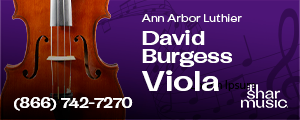We have thousands of human-written stories, discussions, interviews and reviews from today through the past 20+ years. Find them here:
V.com weekend vote: Have you participated in graded music exams?
Many students find motivation in taking graded repertory exams, though these are not as commonplace in the United States as they are elsewhere.

If you have not heard of graded music exams, they are formal assessments that typically involve performing scales, etudes and repertoire, often accompanied by a theory test. They are offered at different levels, so that students (and parents, etc.) can gain a sense of their progress.
Here is a list of some of the most common music exams, and where they take place:
- Australia: Australian Music Examinations Board -- AMEB
- Canada: Royal Conservatory of Music -- RCM
- United Kingdom: Associated Board of the Royal Schools of Music -- ABRSM
- United Kingdom: Trinity College London
- United States: American String Teachers Association Certificate Advancement Program -- ASTACAP
There are other music exams, and some are more localized. I welcome your additions to this list!
As a teacher, I'm happy when students can have a goal that motivates their progress. Last year, my students participated in the ASTACAP Exams, and I'm happy to report that it was a really positive and motivating experience.
What are your opinions about graded music exams for violin and string students? Feel free to answer from your perspective as a student or former student, or as a teacher. Have you participated in a music examination program (or more than one)? Do you wish you could, but they aren't offered in your area? Are exams motivating for you or for your students? Do they help you measure your progress as a student? Or do you feel they interfere with other learning? Please share your thoughts on the subject!
You might also like:
- Determining Level of Progress, ABRSM and other Grading Systems
- Discussion: Strad Article: Should music tuition revolve around exams?
Tweet
Replies
Mary Ellen, I tweeked the vote a little, based on your response here, to include "There were no exams available, back when I was a student." That would be the right answer for me, as well!
Thanks!
I mistakenly assumed graded exams were more universal. For the ABRSM it isn't necessary to pass all 8 grades; Grades 3, 5, 7 and 8 at annual intervals was quite enough for me and gave me satisfying evidence of achievement. Theory wasn't included in my day but was tested as a separate scale; I believe it was necessary to pass grade 5 theory before tackling the higher performance grades. However aural tests were included in every performance exam which I think is a very good idea.
If my memory serves me right, grade 5 theory was a pass requirement in order to proceed to grades 6, 7 & 8 on your instrument. When, decades later and as an adult, my singing teacher suggested that I do grades 7 & 8 (ABRSM), there was an attractive alternative to the theory requirement, called Practical Musicianship. I hope it still exists!
I did ABRSM grades 4, 7 and 8 in the 1960s. Where I teach now, at the Royal Conservatory of Music, the students do several or all grades. Some do none, just private lessons and theory. Theory is required for all school-age kids at the RCM, which helps them understand and memorize what they're playing. They get a certificate for a practical plus theory level.
I am from Canada, and I grew up studying both piano and violin, and I got my RCM level 10 certificates in both piano and violin. I was also an active violin/viola doubler in high school, doing violin for private lessons and solo stuff, and mostly viola for orchestra and chamber music (with some violin and piano mixed in for good measure) due to the viola shortage plus my love of the instrument. As for my RCM exam history, I've done level 4, 8, and 10 on piano, and level 7 and 10 on violin plus the required theory exams, so overall, I've done more than one or two graded exams, but definitely nowhere near most or all of the levels. I considered trying to get my ARCT diplomas in both piano and violin, but decided it was not worth the effort. I think it's good to do a graded exam once in a while, but definitely not at every level.
I voted "most" but that's only because "several" wasn't an option. I'm American, and lived in Dubai for ages 3-12 before moving back to the US in the mid-1990s.
I didn't grow up playing string instruments, but I took piano lessons as a child. Because I started piano lessons while living in Dubai, I took ABRSM exams for both piano and music theory. I took piano grades 3 and 5 in Dubai, and Grade 8 and DipABRSM after moving back to the United States. I also took the music theory grade 5 exam in Dubai, and grades 7 and 8 in the US.
My US piano teacher was not familiar with graded exams before I started preparing for Grade 8, having not seen them either in the US or in Poland where she grew up. I agree with her opinion on the graded piano exams: useful, as long as you're careful not to let them become all-consuming. She especially appreciated the sight-reading and aural tests, both of which she thought were not taught sufficiently in the US.
Sight-reading has been one of my biggest strengths on every instrument I've played, and I think the ABRSM piano exams are responsible for that.
I'm curious.
How are "grades" typically reported for these types of exams? Is it a letter or number grade, or Pass/NoPass. Is there written feedback for participants, as part of the "grading" process?
ABRSM "Grades" numbered 1 to 8 indicate the level of the exam, not the player. In my day the player was scored on a scale of 0-100 and accorded a "pass", "merit" or "distinction". The examiner (I remember one of mine was a senior violin professor at the RAM) wrote a sentence or two of comment for each of the three pieces performed.
When I was studying piano at high school, exams in both theory and practical were almost universal, (for violin too). AMEB
For theory , a pass is 65% and it goes upwards to credit , distinction, honours. On their website they list pass and upwards for the practical exams. I remember a pass being 85 % but that was a long time ago.
I would never put myself through that again, though my fellow older learners who started with that system find ourselves still needing to use it as a benchmark.
I don’t regret it as it certainly gave you something to work towards .
I didn't have a graded violin program, but we had "Solo and Ensemble Festival" annually, and you could enter with a piece and get a score with feedback. I was always dinged for intonation. In 10 years with one teacher, and then one year with a member of the Detroit Symphony, nobody ever taught me about "ring tones" or how to actually tune double stops.
I got ABRSM Grade 8 before 1959 and 2,3,4,5,5 theory and 7 before that, and I don't think the Associated Board exams were anything new then. I would think any vcommer brought up in the UK would have have had these opportunities.
This article has been archived and is no longer accepting comments.
















August 25, 2024 at 01:58 AM · There didn’t seem to be an option for someone like me for whom such exams were not even thought of when I was a student (USA). While they are available now, I don’t have my students do them.
In my experience, the annual cycle of region orchestra auditions/All-State orchestra auditions/solo and ensemble contests/youth orchestra auditions is more than enough to keep my students motivated. Frankly, I cannot imagine adding one more thing to the list.
I did once have a student whose mother informed me that her son‘s piano teacher said that completing the sequence of exams was equivalent to a bachelor’s degree in music. I was struck speechless for a few moments before I told her that no, it was not.